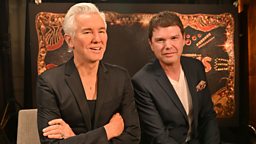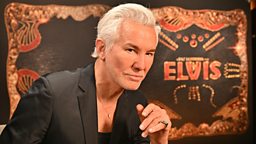7 things we learned from Baz Luhrmann's My Soundtrack Stories

Acclaimed Oscar-nominated filmmaker Baz Luhrmann is renowned for movies with wall-to-wall soundtracks such as Moulin Rouge, Romeo & Juliet and The Great Gatsby.
He joins BBC Radio 2 to share the music of his life and films in My Soundtrack Stories
We've taken a listen and below you can find 7 things we learned from Baz's chat with James King...
-
![]()
Listen to Baz Luhrmann: My Soundtrack Stories
Acclaimed filmmaker Baz Luhrmann takes James King through the music of his films, from his 1992 debut 'Strictly Ballroom' to 'Elvis', his brand new biopic of the King of Rock and Roll.
1. Baz went through over 900 recordings of Elvis for his new film
Baz says: "I had to select not the ones I love, not the ones I want in there, but the ones that tell the story.
"And I’m going to drop a list of Elvis that isn't in the movie - Elvis that is really worth listening to so you don’t have to wade through the 900 recordings because not all of them are great!
"But there’s amazing gems, I’ve heard Elvis sing Beatles and Dylan, because I had access to all the stuff out of the salt mines.
"The thing about Elvis that is not much talked about, I wouldn’t say he was a show-off but he could sing. He’d be like 'watch me do Glen Campbell', 'watch me sing the Beatles' - you know, his vocal dexterity, in our country we call it a bowerbird, the ability to pick up bits and pieces and make up your own thing - he did that throughout his entire musical life."
2. Baz reveals the record company weren't initially keen on his Romeo & Juliet soundtrack
Baz says: "They said 'it's a mess, it sounds like a mixtape!' I said that's what I wanted, I want a mixtape!
"The music is a door that opens up audiences that otherwise might not be interested into the film.
"If a song is great it moves through time and geography."
3. Filming the Gatsby parties were as wild as in the story, sort of…
Baz says: "There are no extras in my movies, they’re all characters, and I get everybody very very involved. And then, one thing with Leonardo [Di Caprio] – everyone’s so scared of the star – he’ll get out there and make sure they all feel not scared of rubbing against him or passing him or whatever.
"We shoot it quite meticulously, but then, at the very end when I know I’ve got all the mechanics of it, I get all of the techno cranes ready and we pump the music up crazy – and maybe we have just a little whisky or two, and because it’s digital I just let it roll… because you don’t care if the set gets destroyed or whatever, and we actually do let it go a bit crazy, so they’re jumping in the water. And we sort of blow it out for about 20 minutes, and that’s in the movie. A lot of those shots just seem quite visceral – because also they’ve practiced it so they know where to be, it’s not dangerous you know? And it gives you this sort of realist frisson in it."
4. Jay-Z and Luhrmann used hip hop in The Great Gatsby to reflect how jazz was perceived in the roaring 20s
Baz says: "Fitzgerald wrote in Gatsby about an African American street music called jazz - called jass at the time actually. And people went ‘why are you doing that? First of all it’s offensive, and second of all it’s a fad’ you know… It wasn’t a fad, jazz prevails - funny that. But how do you make a young audience understand what that felt like?
"I saw Jay and he saw the video and he said well we’re not even talking about it we have to do this. Our whole thing was how current black street music was hip hop and how we translate the two things, and whether you agree with us or not, we had to get that audience to understand. Gatsby isn’t this 100 year old book written by some old guy - this was like a visceral, happening text that was written by a 30 year old guy who was doing really rad things, and so that’s what we set out to do.”
5. Elephant Love Medley was the birth of the musical mash-up, and Elton John helped make it happen

Baz says: "It’s funny, it (Elephant Love Medley) has been called a jukebox musical and a mash-up, but actually when it was made I don’t recollect anyone ever mentioning anything called a mash-up - and I’ll tell you why, because you couldn’t do it. Because Anton (Luhrmann’s Music Supervisor) and I had to break a lot of rules and it’s only when I rang Elton John, who at the time I did not know, and said look I want to do this. I flew all the way from Australia to London, and I had this terrible fever, and I said look Elton I’m really sorry I don’t think I can see you, I’ve got this terrible cold and you’ve got to perform, and he said ‘don’t worry about that darling, come around.’, and I played him my video and he saw Ewan, he said we’re going to do this, and he kind of led the charge with all the other artists.
"And so the publishing companies who said there’s no way we can have this idea of chopping up the music and making it Elephant Love Medley, and it was the artists who could see ‘oh you’re going to take my music and make a musical.’ Paul McCartney, Phil Collins sent me a note that said ‘look I love this idea, Merry Christmas, I’ll make it happen.’ And then, the mash-up was born.”
6. A Baz Luhrmann musical tour (and rave) might be on the cards
Baz says: "I’ve always thought what I might do is a sort of red curtain trilogy plus concert tour. I mean I’m kind of busy! But a tour of all the music from the films with score cues and then have a rave at the end… with some merch!”
7. Time After Time is Luhrmann’s good luck charm
Baz says: "I was working on a play as a kid and we were devising it and I was in a department store, and I was just thinking oh we need a love theme, and honestly Time After Time [the Cyndi Lauper 1984 hit] - literally this guy comes on the radio… says oh here’s this new song, Time After Time. First of all the rhythm, was actually as it turns out a rumba rhythm, knowing ballroom dancing and we were like oh this is the perfect rhythm, and the words were absolutely perfect and I rushed back and I said ‘oh we’ve got this song that we could put in the show’ which we did.
"The show got asked to go to a drama school event in Czechoslovakia, and this is before Glasnost, so this is the first ever visit to the sort of Soviet block of a drama school, and when we played that song all the Soviet student kids from every other country rushed the stage, it was an amazing effect. So I’ve always thought it was a good luck charm… 'if you fall I will catch you, I will be waiting time after time’, there’s just something so emotionally clear about that, that it’s a sort of good luck charm for me."
Like us on Facebook, on Instagram at bbcradio2, or follow us on Twitter @BBCRadio2
Listen to Radio 2 on BBC Sounds, or find out other ways you can listen.
-
![]()
Listen to Baz Luhrmann: My Soundtrack Stories
Acclaimed filmmaker Baz Luhrmann takes James King through the music of his films, from his 1992 debut 'Strictly Ballroom' to 'Elvis', his brand new biopic of the King of Rock and Roll.
-
![]()
Listen to Quentin Tarantino's Movie Mixtape
Acclaimed director and writer Quentin Tarantino discusses the music from his movies with James King in this chat from 2019.


